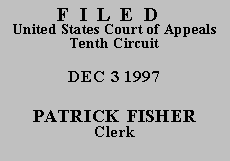

| UNITED STATES OF AMERICA,
v.
MARY FRANCES BENNETT, also
known as Freonia Hampton, also
known as Mary Deal |
No. 97-6063
(D.C. No. CR-89-132-R) |
Several years later, defendant filed a motion pursuant to Rule 60(b) of the Federal Rules of Civil Procedure challenging the trial court's jurisdiction in criminal cases. Citing 18 U.S.C. § 3231, under which the district courts of the United States "have original jurisdiction . . . of all offenses against the laws of the United States," the district court denied the motion as "obviously frivolous." See Appellant's Br., Ex. C.
Ms. Bennett was, and remains, adamant that her motion was filed pursuant to Rule 60(b) of the Federal Rules of Civil Procedure. Rule 60(b), however, has no application whatever to criminal matters. We would typically be inclined to construe Ms. Bennett's pro se motion liberally, see Riddle v. Mondragon, 83 F.3d 1197, 1202 (10th Cir. 1996), as one filed pursuant to 28 U.S.C. § 2255, which provides an appropriate means to raise collateral challenges to jurisdiction. But Ms. Bennett's motion states unequivocally that it is not to be construed as a motion under 28 U.S.C. § 2255, an insistence firmly maintained on appeal. We must therefore find that the appellant was, and is, aware of 28 U.S.C. § 2255, and has specifically chosen not to invoke its provisions.
Because the rules of civil procedure cannot provide Ms. Bennett with the relief she seeks, the order of the district court is AFFIRMED. The mandate shall issue forthwith.
ENTERED FOR THE COURT
Carlos F. Lucero
Circuit Judge
*.The case is unanimously ordered submitted without oral argument pursuant to Fed. R. App. P. 34(a) and 10th Cir. R. 34.1.9. This order and judgment is not binding precedent, except under the doctrines of law of the case, res judicata, and collateral estoppel. The court generally disfavors the citation of orders and judgments; nevertheless, an order and judgment may be cited under the terms and conditions of 10th Cir. R. 36.3.